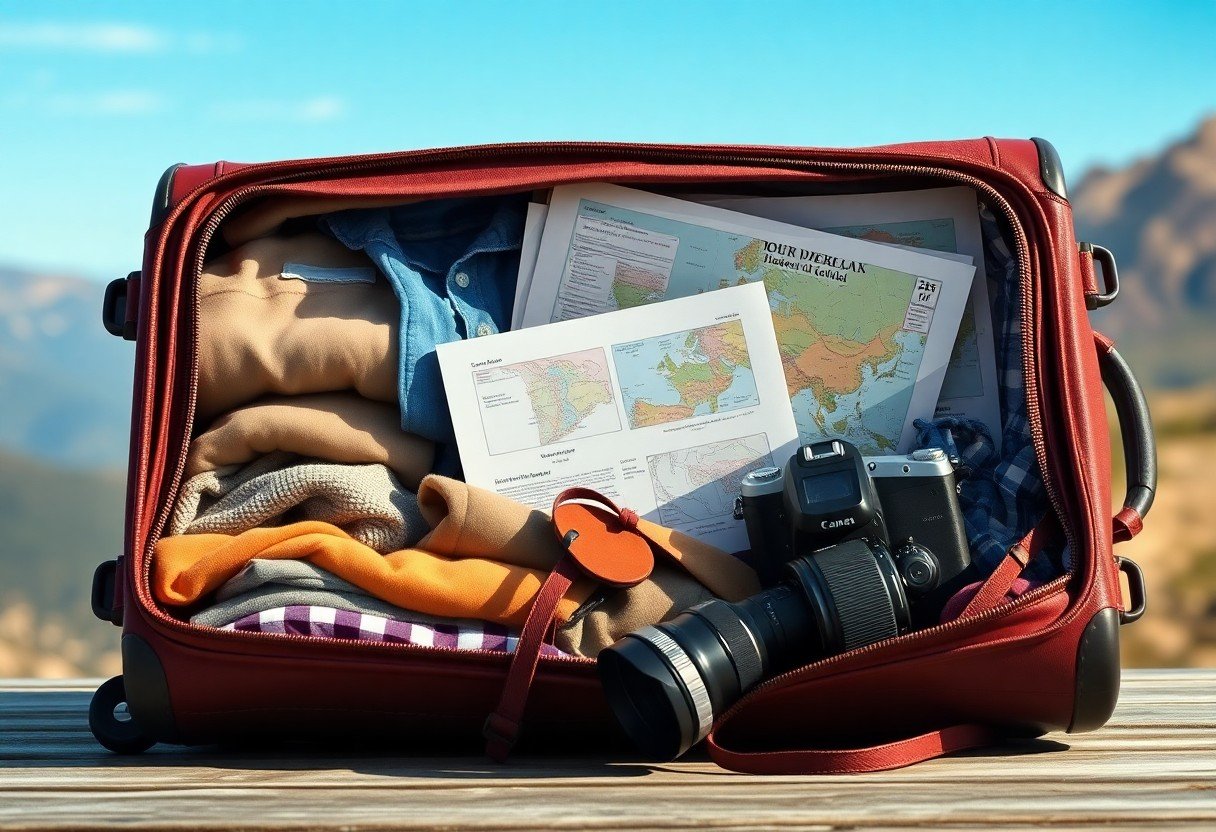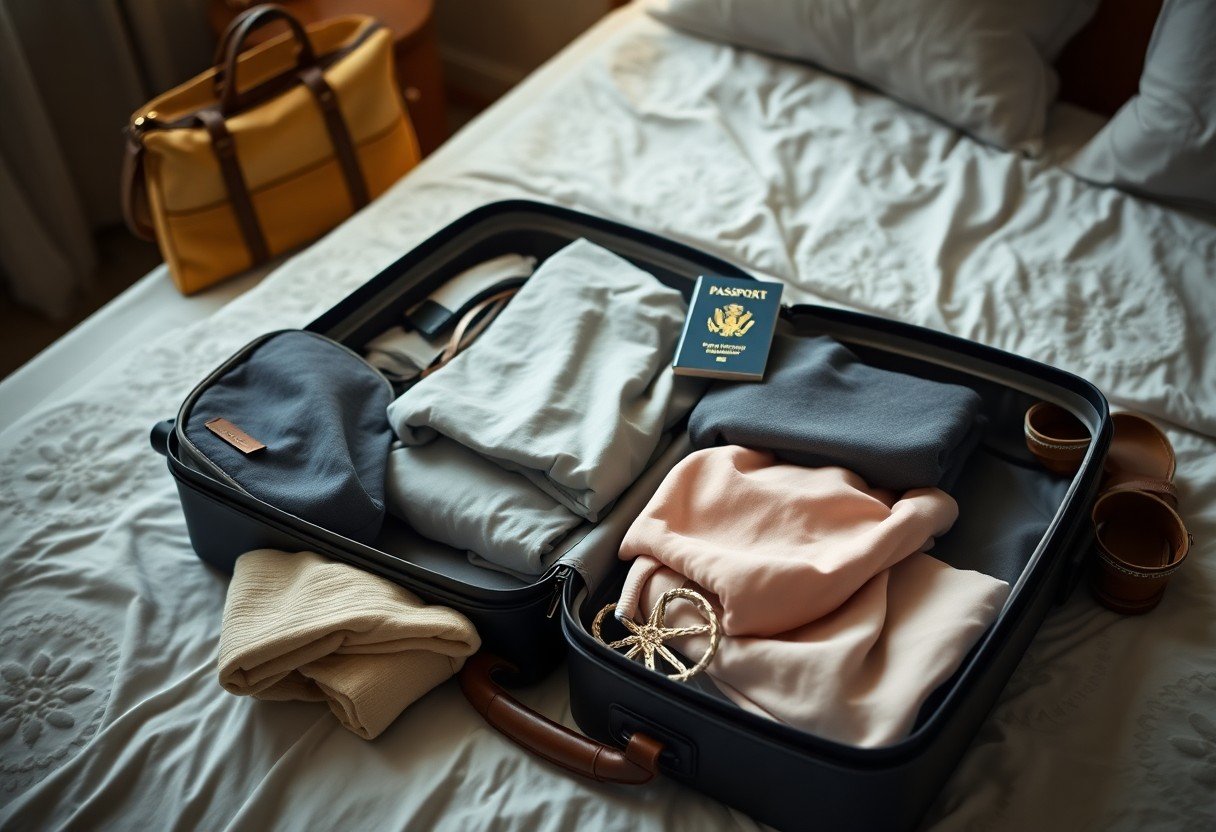Over the years, countless travelers have discovered that the key to enjoyable journeys lies in a few crucial strategies. To ensure your next adventure is free from unnecessary stress, you need to plan ahead, stay organized, and prioritize your well-being. This guide will provide you with practical tips that can help you navigate potential pitfalls and enhance your travel experience. Whether you’re a seasoned explorer or a casual vacationer, these insights will empower you to embrace the joy of discovering new destinations with confidence.

Key Takeaways:
- Plan your itinerary but allow for flexibility to explore unexpected opportunities during your journey.
- Pack smart by choosing versatile clothing and crucial travel documents to minimize stress on the road.
- Stay organized by using travel apps or journals to keep track of bookings, itineraries, and important information.
- Maintain a positive attitude and embrace the journey, as travel can sometimes present unforeseen challenges.
- Prioritize self-care by taking breaks, eating well, and staying hydrated to enhance your overall travel experience.
Types of Travel
The world of travel is diverse and offers various styles depending on your preferences and circumstances. Understanding the different types of travel can help you tailor your experience to ensure a memorable adventure. Some of the most popular categories include:
| Solo Travel | Traveling alone to explore personal interests and self-discovery. |
| Group Travel | Traveling with a group for shared experiences. |
| Family Travel | Planning trips that cater to all family members. |
| Adventure Travel | Engaging in high-energy activities like hiking or scuba diving. |
| Cultural Travel | Exploring local customs, arts, and heritage of different regions. |
The Solo Travel experience can be one of the most liberating ways to explore the world. Now, when you commence on a solo journey, you have the perfect opportunity to focus entirely on your own interests without compromising. It’s an excellent chance to meet new people, research into local cultures, and perhaps even find yourself along the way. Plus, you’re free to create your own itinerary and make spontaneous decisions, which can lead to some of the most unforgettable moments of your life.
Another benefit of solo travel is personal growth. You will face challenges independently, from navigating airports to finding accommodations, which can boost your confidence. If you’re seeking more Essential Tips for Your Stress-Free Journey, consider documenting your experiences, as this can be a rewarding way to reflect on what you’ve learned during your travels.
Group Travel
Traveling with others can create bonds and enrich the experience, as shared moments often translate to lasting memories. Travel with a group allows you to enjoy the camaraderie of friends or family while exploring new destinations. Whether it’s a guided tour or a spontaneous road trip with friends, group travel can feel more secure, especially in unfamiliar environments. Keep in mind that with a larger group, you may need to navigate various personalities and preferences, which can be both challenging and rewarding.
Understanding the dynamics of group travel is crucial for a successful trip. You’ll benefit from pooling resources, which can result in savings on accommodations and activities. Additionally, group discounts often apply in various destinations, making it economically advantageous. Make time for everyone’s interests while also managing different schedules. Incorporating group activity options can help balance the desires of all participants.
Family Travel
There’s nothing quite like traveling with your family to create memorable experiences that strengthen your bonds. Family travel often requires more planning and consideration of the various ages and interests involved. Think about family-friendly destinations, accommodations, and activities that cater to everyone, from toddlers to grandparents. Balancing different preferences and expectations can be a challenge, but involving every family member in the planning process will help ensure a trip everyone can enjoy.
For instance, if you aim to visit a theme park, make sure to include downtime in your itinerary for rest and relaxation. Prioritize safety measures and keep an eye on young children, as navigating crowded places can be daunting. When organized well, family travel can facilitate strong connections, laugh-filled moments, and cherished stories for future gatherings.
Key Tips for Stress-Free Travel
It’s vital to embrace a few key strategies to ensure your adventures unfold as smoothly as possible. Prioritizing organization and flexibility can make a world of difference in your travel experience. Start by creating a checklist that covers all necessary aspects of your journey, from bookings to activities.
- Stay informed about your destinations
- Have a backup plan for accommodations
- Check for travel restrictions
- Keep important documents handy
- Learn a few local phrases
These practices will help you navigate unexpected situations with ease. Knowing these tips can empower you to travel with confidence.
Planning and Preparation
Preparation is the backbone of a stress-free travel experience. Before you even step foot outside your door, outlining an itinerary will serve as a guiding map for your adventure. Consider using online resources like How to Plan a Trip: A Foolproof Guide for Stress-Free … to create a structured plan that fits your needs. This lets you allocate time for activities, rest, and spontaneity, ensuring you get the most out of your trip without feeling rushed or overwhelmed.
Packing Essentials
While packing, it’s vital to optimize your luggage for both vitals and convenience. List down the items that you will need based on your itinerary, climate, and activities. Don’t forget to include items that enhance your comfort and safety, such as a first aid kit and portable charger. You should also be mindful of weight limits, to avoid surprise fees at the airport.
Plus, consider packing versatile clothing that can be layered and mixed-and-matched. It’s best to stick to a color palette that allows for easy coordination, which reduces the amount of clothing you need to bring. Pack a travel-sized toiletries kit to lighten your bag and adhere to airline regulations. Additionally, prioritize important items such as medications, travel insurance documents, and any necessary chargers to ensure you remain prepared throughout your journey. Being organized with your packing ensures a more enjoyable adventure overall.
Step-by-Step Guide to Booking
Now that you have decided on your travel destination, the next step is to navigate the process of booking your trip. This involves strategic planning regarding your flights, accommodations, and itinerary. Follow this handy guide to make your booking experience as smooth as possible.
| Step | Description |
|---|---|
| Research | Look into various airlines, hotel options, and potential activities. Use comparison websites to get the best prices. |
| Booking | Once you’ve found suitable options, book your flights and accommodations directly through the airline and hotel websites for added security. |
| Confirmation | Check your emails for booking confirmations and keep a record of all important details related to your trip. |
Choosing Flights and Accommodations
Clearly, your choice of flights and accommodations can greatly affect your overall travel experience. Begin by evaluating your budget and the level of comfort you desire. Use flight comparison websites to check different airlines and their prices. Pay attention to factors such as layover times and flight durations; these can significantly impact your travel time. With respect to accommodations, consider the location. Staying closer to attractions can save you both time and money.
It is advisable to book your flight and hotel as early as possible, as prices tend to rise as your travel date approaches. Focus on finding a balance between cost, comfort, and proximity to key attractions. Some travelers may prefer boutique hotels for a unique experience, while others may opt for familiar chains for that extra peace of mind. Whatever your preference, ensure that you read through reviews and check the cancellation policy before finalizing your bookings.
Creating an Itinerary
Creating a well-structured itinerary is crucial for making the most of your trip. Start by listing out all the places you wish to visit and the activities you want to engage in. Make sure to allocate time for each activity, keeping in mind factors such as travel time and possible delays. A good itinerary serves as your roadmap, maximizing your travel experience while reducing the chance of missing out on key attractions.
With a solid itinerary in place, not only do you ensure that you won’t miss must-see sites, but you can also have a better grasp of your daily budget. Don’t forget to sprinkle in some downtime; over-scheduling can lead to a more stressful experience. Be flexible in your planning so that you can adapt if unexpected opportunities or challenges arise. This adaptability can turn an ordinary journey into an extraordinary adventure!
Factors to Consider Before Traveling
To launch on a smooth and stress-free adventure, you need to mull over several factors that can significantly affect your trip. Evaluating these elements not only sets the stage for your journey but also safeguards you from possible inconveniences. Here are a few key considerations:
- Budget for your trip
- Destination specifics
- Travel companions and their needs
- Timeframe and itinerary planning
- Travel restrictions or requirements
Perceiving the importance of these factors can lead to informed choices that enhance your overall travel experience.
Budgeting for Your Trip
The first step in organizing your adventure is establishing a solid budget. This involves not only determining how much you can spend but also outlining where your funds will go. You need to consider primary expenses such as accommodation, transportation, meals, and activities. While it’s tempting to overspend on experiences, balancing your budget is vital for a stress-free journey.
Exploring budgeting tools or apps can help you allocate your finances effectively, ensuring you don’t run out of funds mid-trip. Factor in extra expenses for souvenirs or unexpected situations, and always have a fallback plan. This approach not only helps you enjoy your adventure but also mitigates the anxiety often associated with financial management while traveling.
Destination Research
Assuming you’ve picked a destination, conducting thorough research is vital for maximizing your travel experience. Aim to gather information regarding local customs, cultural norms, and travel tips specific to that area. Understanding the climate, language, and popular attractions can help you prepare and avoid any cultural faux pas that could cause discomfort during your travels.
Factors such as public safety, local laws, and healthcare access should also be on your radar. Knowing the crime rates and any travel advisories will help you to take necessary precautions. Additionally, understanding the local transportation options available to you can ease logistics, allowing you to navigate efficiently and enjoy your surroundings. Being well-informed will not only increase your enjoyment but also enhance your safety during your travels.
Pros and Cons of Popular Travel Methods
Not all travel methods are created equal, and each comes with its own set of advantages and disadvantages. Understanding these can help you make the most informed choices for your next adventure. Below is a breakdown of some popular travel methods, detailing what to consider before making your decision.
| Travel Method | Pros and Cons |
|---|---|
| Air Travel | Fast and efficient but can be expensive and often uncomfortable with long security lines. |
| Road Travel | Flexible and offers scenic views but can be tiring and subject to delays such as traffic jams. |
| Train Travel | Relaxing and scenic but less convenient for reaching remote destinations. |
| Bus Travel | Cost-effective but can be less comfortable and prone to delays. |
| Cruise Travel | All-in-one convenience but can be crowded and limited in destination variety. |
| Biking | Eco-friendly and healthy but requires physical stamina and can be unsafe in urban areas. |
| Walking | Direct and enjoyable but can be time-consuming and tiring over long distances. |
| Car Rentals | Convenient for road trips but can be expensive and involves driving in unfamiliar areas. |
| Motorhomes | Provides comfort and mobility but requires careful planning and can be less fuel-efficient. |
| Shared Rides | Cost-effective and social but can involve waiting and make for unpredictable travel times. |
Air Travel
While air travel is often the fastest way to cover long distances, it isn’t without its drawbacks. You’ll find that it allows you to reach your destination in a fraction of the time it would take by car or train. However, the experiences of delays, long security lines, and potential seat discomfort make it necessary to plan your airport journey carefully. It’s also important to factor in baggage restrictions and often high ticket prices, especially during peak travel seasons.
Additionally, when booking flights, keep an eye out for budget airlines that may offer considerably lower fares, but beware of hidden fees that can add up quickly. On the flip side, frequent flyer programs and travel points can provide worthwhile benefits to frequent travelers. Ultimately, dissecting this travel method allows you to navigate the many pros and cons effectively and enjoy a smoother flying experience.
Road Travel
Pros of road travel include the incredible flexibility it provides, allowing you to choose your own routes and make spontaneous stops along the way. With a vehicle, you can venture into remote areas that may not be easily accessible by public transport, adding an element of adventure to your trip. However, road trips can be physically demanding and may expose you to risks such as driver fatigue, unexpected weather changes, and heavy traffic conditions that lead to delays.
Traveling by car means you have the freedom to create your itinerary. You can pack your favorite snacks and playlists, allowing you to tailor the experience to your liking. The ability to take scenic routes enables you to experience breathtaking views that you would otherwise miss when flying. Just ensure your vehicle is well-maintained, keep emergency supplies handy, and use your GPS wisely to navigate safely on your journey.
Common Travel Challenges and Solutions
After all the excitement of planning your upcoming adventure, you may encounter a few common travel challenges that can put a damper on your journey. Understanding how to deal with these issues in advance can significantly enhance your experience. From unexpected delays to overcoming language barriers, knowing how to tackle these hurdles can make your travels much more enjoyable.
Dealing with Delays
While delays are often an unavoidable part of travel, you can learn to manage them effectively. Start by giving yourself extra time when possible and configuring your itinerary to allow for potential hold-ups. Whether it’s a late flight or a traffic jam, having this extra cushion will reduce your stress levels considerably. It’s also wise to stay informed about your travel status through apps or alerts, enabling you to adapt your plans if necessary.
Overcoming Language Barriers
Even if you find yourself in a country where you don’t speak the language, you can still navigate through your travels smoothly. Start by downloading translation apps or carrying a pocket phrasebook, which can help facilitate conversations with locals. Most importantly, don’t hesitate to utilize gestures or body language when words fail; people will appreciate your efforts regardless of the outcome.
Another way to counteract language barriers is to engage with locals; they often enjoy teaching visitors about their language and culture. Forge connections through simple phrases, and you’ll be surprised at how far a friendly smile and a willingness to communicate can take you. Be open to new experiences, and you may find that these interactions can lead to unexpected adventures, heightened cultural appreciation, and stronger memories of your journey. Always remain patient and don’t be afraid to ask for help; most people will go out of their way to assist you.
To wrap up
Conclusively, adopting necessary how-to travel tips can significantly enhance your adventure experience, ensuring that your journeys remain enjoyable and stress-free. By planning your itinerary in advance, keeping your travel documents organized, and packing wisely, you can avoid common pitfalls and focus on what truly matters—the joy of exploration. Staying flexible in your plans allows you to embrace the unexpected, turning potential headaches into beautiful, spontaneous memories.
Additionally, prioritizing your health and well-being during your travels helps maintain your energy and enthusiasm. From staying hydrated and eating well to ensuring you get enough rest, taking care of yourself allows you to fully immerse yourself in the rich experiences your destination has to offer. As you commence on your next adventure, apply these tips to pave the way for effortlessly enjoyable travels, allowing you to create lasting memories without the accompanying stress.




